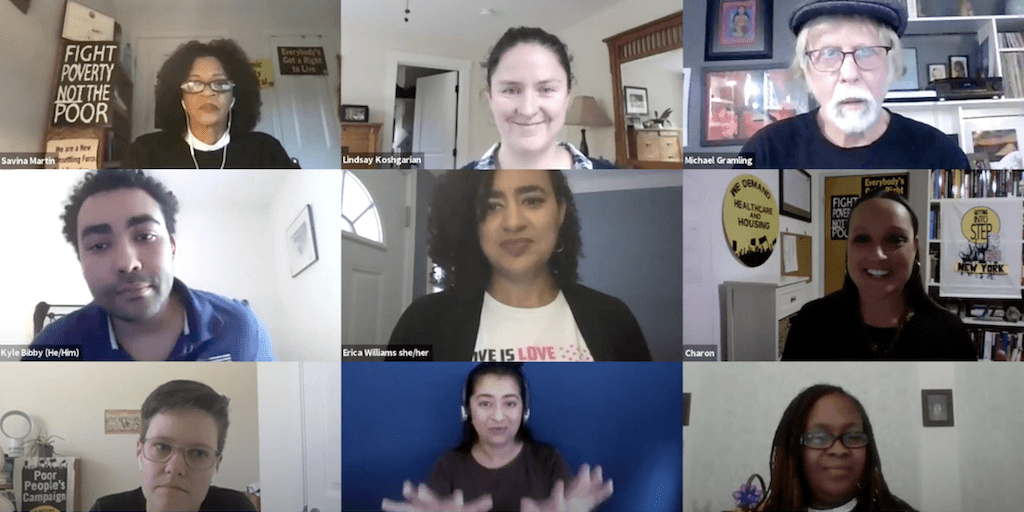
“A few years ago, there was a shining moment in that struggle. It seemed as if there was a real promise of hope for the poor. Through the poverty program there were experiments, hopes, new beginnings, then came the build up in Vietnam. I watched this program broken and eviscerated. As if it was some idle plaything of a society gone mad on war. I knew that America would never invest the necessary funds or energy in rehabilitation of its poor so long as ventures like Vietnam continued to draw men and skills and money like some demonic destructive suction tube. So I was increasingly compelled to see war as an enemy of the poor and to attack it as such.”
Rev. Dr. Martin Luther King Jr., “Beyond Vietnam” (1967)
We are living in a time of great contradiction. On one hand, we are living in a nation that has an abundance of resources capable of meeting the needs of everyday people and addressing the widespread and systemic injustices that exist. At the same time, we know there are 140 million people who are poor, or one emergency away, one paycheck away, or one healthcare crisis away from being poor. While everyday people are facing the harsh repercussions of a global pandemic alongside an economic and political crisis, those at the top have seen massive gains. Between March and October of 2020, nearly 67 million people lost work. By the end of the year, one in five adults with children reported that, at times, they didn’t have enough to eat, while one in five renters were behind on their payments and faced the threat of eviction during the winter months of a still rampant virus. At the same time, the wealth of America’s 651 billionaires increased by more than $1 trillion to a total of about $4 trillion.
The vast inequality we are currently experiencing challenges popular narratives that blame the poor for our poverty. Poverty and inequality are caused by economic and political structures, immoral policies, and immoral budgets. The crises we currently face are revealing these contradictions and move us to challenge the priorities this country has set forth to provide for the true common defense of our people.
Dr. King reminds us that, “I am convinced that if we are to get on the right side of the world revolution, we as a nation must undergo a radical revolution of values. We must rapidly begin to shift from a “thing-oriented” society to a “person-centered” society. When machines and computers, profit motives and property rights are considered more important than people, the giant triplets of racism, materialism, and militarism are incapable of being conquered. . . . A nation that continues year after year to spend more money on military defense than on programs of social uplift is approaching spiritual death.”
King realized then what we know more strongly now: that profit motives drive our political decisions and that more and more the interlocking evils of systemic racism, poverty, militarism and ecological devastation result in the “cruel manipulation of the poor,” by a system that views our lives — the lives of the 140 million poor and low income people in this country and billions more around the world — as disposable.
“Providing for the Common Defense” was the final session at the Moral Policy in a Time of Crisis conference. We began to examine how the distorted national priorities and disinvestments in programs of social uplift have had brutal effects on everyday people, who lack health care in the midst of a pandemic and who in a time of great abundance are being denied housing, access to water and sanitation, living wages, worker protections and any adequate system of social welfare. Through this session, we took up a charge to challenge this country to stop the war on the poor, to embark in a true revolution of values and lift up a Jubilee platform that reprioritizes the lives and needs of everyday people.
Read a summary of the panel discussion below and watch the video here:
Lindsay Koshgarian – Director at the National Priorities Project, “Common Defense: Reprioritizing Our Budgets for True Security”
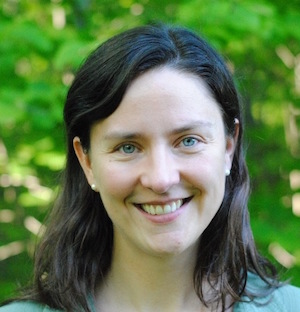
Lindsay Koshgarian’s work and commentary on the federal budget and military spending has appeared on NPR, the BBC, CNN, The Nation, U.S. News and World Report and other media. At the National Priorities Project, her work focuses on the intersection of military and domestic federal spending. In her presentation, she offered a look at where our federal dollars are going.
Koshgarian pointed out that from the $1.4 trillion discretionary budget, our country is spending over half of this budget on the military and war. Another 10% of the federal discretionary budget is used to finance the Department of Homeland Security, ICE, the border patrol, federal prisons and policing grant programs – all of which contribute to domestic militarization of our society and our lives. The last third of the budget must be divided up to help cover essential programs our communities need for housing, public health and medical research, public education, veterans benefits and more.

Koshgarian also pointed out that the U.S. military budget, at $732 billion, is larger than the next 10 countries combined. Of this budget, $687 billion is allocated to the Pentagon, half of which is spent on military contractors and weapons manufacturers.
With over 800 military installations around the world, Koshgarian noted, “We are the colonizing force on earth right now. That is what our military presence is and that is what it has been for a very long time.” To counter the propensity of U.S. policies to continually expand our military spending, Koshgarian turned to the work of the Institute for Policy Studies and the Poor People’s Campaign’s demand to cut the military budget in half by stopping the current wars, cutting our spending on nuclear weapons and money allocated to defense contractors. Such cuts could save at least $350 billion that could better be spent on the everyday needs of our communities like a guaranteed basic income and universal healthcare.
Erica Williams – Center on Budget and Policy Priorities, “Antiracist, Equitable State Response to COVID-19 and Stronger Recovery”
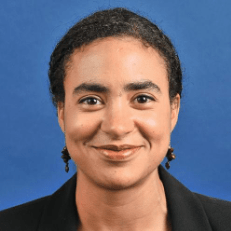
Erica Williams is Vice President for State Fiscal Policy at the Center on Budget and Policy Priorities. She helps lead the organization and its 40-person State Fiscal Policy division and supports progress of the State Priorities Partnership, a network of over 40 state-level fiscal policy shops advancing racial, gender, and economic justice. Williams brings a deep commitment to state-level infrastructure and policy efforts that break down barriers to opportunity and enable all communities to thrive.
The question Williams posed at the conference was, “How long are we willing to ignore or exacerbate long-standing inequities, things that have been here since the founding of this country?” During the panel, Williams offered three principles that could be another course towards antiracist, equitable economic recovery that extends to all people.
The first principle is to target aid to those most in need right now: our essential workers, folks who are kind of at high risk in this pandemic, and those that have been experiencing chronic economic and health insecurity. The second principle is to advance antiracist and equitable policies that will dismantle persistent inequities. Finally, the third principle is to protect state finances and preserve state budgets as the bedrock of economic growth and opportunity. States must maximize the use of their reserve funds and avoid taking austerity measures. This might also include policies that increase taxes on the wealthy or corporations to maintain enough resources at the state and local levels.
From the Frontlines: Common Defense, Wisconsin, Kentucky, and New York
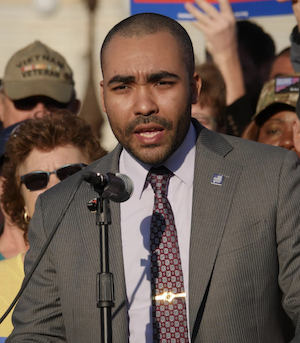
Kyle Bibby is a former Marine Corps Infantry Captain and Afghanistan war veteran. He is currently the National Campaign Manager at Common Defense.
During the panel, Bibby highlighted problems with defense spending, including how egregious it is that we spend 50% of discretionary spending on the Department of Defense. He also noted that there are few spaces where the broader militarization of our culture is even discussed, from the militarization of our police or having police in our public schools and more. In “Beyond Vietnam” King outlined Vietnam’s devastation at the hands of “deadly Western arrogance,” noting, “we are on the side of the wealthy, and the secure, while we create a hell for the poor.” Bibby offered that real “common defense” requires investing in our communities, not having hundreds of military bases overseas that cause trauma to communities of color around the world, in particular.
Among the people who would be impacted by a drawdown of our military are the nation’s veterans. As a veteran, Bibby noted that “veterans around the country are exhausted, frustrated but we aren’t adequately funding the institution that is charged with their care: the Veterans Administration, which is underfunded and understaffed.”
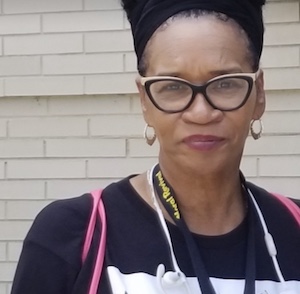
Min. Dr. Savina Martin is a lifelong activist and organizer from Massachusetts. She is an Army Veteran and has organized with homeless men, women and veterans throughout Boston and San Diego, CA. In response to a time of great turmoil and immoral policy, Rev. Dr. Martin Luther King urged us to pursue a “a radical revolution of values” emphasizing love and justice rather than economic nationalism. During her remarks, Min. Dr. Savina Martin called back to these proposals. Rev. Martin called on us to proclaim relief, reconstruction, and restoration, as the season of Jubilee is at hand. This means to: prioritize the abundant resources we have towards the needs of the poor, who have been under attack at home.
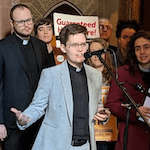
Rev. E. West McNeill is the executive director of the Labor-Religion Coalition of NYS, co-chair of the NYS Poor People’s Campaign: A National Call for Moral Revival and an ordained minister in the United Church of Christ.
Rev. West spoke to the conditions in New York, which is generally considered to be a wealthy state, without also acknowledging that it is also a deeply unequal state. Of the 140 million poor and low-income people in the nation, almost 9 million live in New York state, accounting for 45% of the state’s total population. They criticized Governor Cuomo’s austerity politics, which include an arbitrary 2% spending cap that leads to cuts to education and health care every year. Even before the pandemic, Gov. Cuomo was pushing to cut Medicaid by $2.5 billion. During the pandemic, he cut funding to public hospitals, even though public hospitals in New York City were being overwhelmed with COVID patients. Some of the disparities of the health court in New York City were due in part to the 41 hospitals that have been closed since 2003, many of them in predominantly black and brown communities.
This is not a problem of scarcity, but austerity: from March to June 2020, billionaires in New York State saw their wealth rise by $77 billion, while state revenue went down $13 billion. Rev. West reminded us how wrong it is to balance the budget crisis on the backs of the poor, when wealth is abundant.

Michael Gramling is a leader in the Kentucky Poor People’s Campaign. He has been working in education for more than 35 years and began his career working in a Head Start classroom.
Gramling spoke of the vast inequities in Kentucky, where the wealthiest 1% of Kentuckians pay only 7% of their income in state and local taxes while the poorest 20% pay nearly 10% of their income in taxes. As he said, “ if you’re already paying more than 50% of your income for rent, this taxation makes desperate circumstances completely unbearable. Choices about rent, food heating and medicine become impossible to navigate.”
On top of this, in the midst of a national health crisis, Kentucky taxpayers continue to contribute billions to non-emergency government funds. In 2019, Kentucky taxpayers contributed $6 billion to the Pentagon and military funds that could have been used to fight poverty. As Dr. King mentioned in “Beyond Vietnam”, profit motives and property rights are considered more important than people. We must radically shift away from these values so that we can begin the shift from a “thing-oriented society to a person-oriented society.”
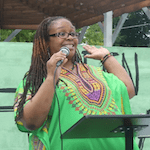
Dana Kelley is an organizer with North Side Rising in Wisconsin.
In “Beyond Vietnam”, Rev. Dr. Martin Luther King commented that he knew this country wouldn’t “invest the necessary funds or energies in rehabilitation of its poor so long as adventures like Vietnam continued to draw men and skills and money like some demonic, destructive suction tube.” During her comments, Kelley spoke to the effects of that destruction on her community in Milwaukee. She spoke to the devastation Milwaukee suffered when it was deindustrialized, with the disparities within communities of color and the distorted priorities reflected in the state budget. While close to 47% of Wisconsin’s state’s budget goes to fund the police, only 2% goes to the health department. In Milwaukee, approximately 25% of the city budget is devoted to public safety-related expenses and only 1.5% to public health-related spending. This focus on defense is also echoed at the federal level, given that Wisconsin law enforcement agencies received $41.6 million in surplus Department of Defense equipment to further militarize police activities.
As we uplift the violent state of American defense, we are also charged with imagining what true safety could look like for all of us and organizing towards that reality. Fight poverty, not the poor!